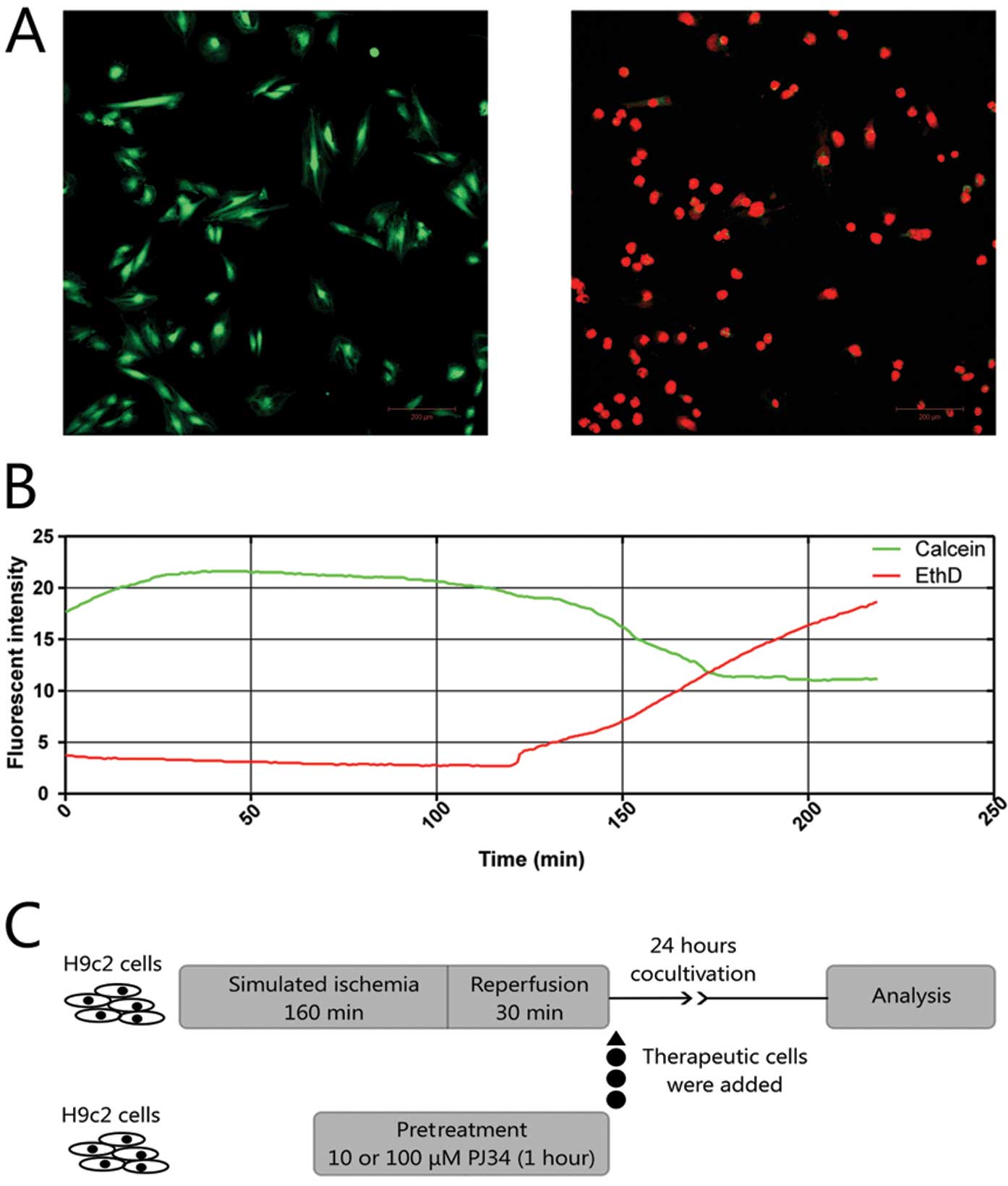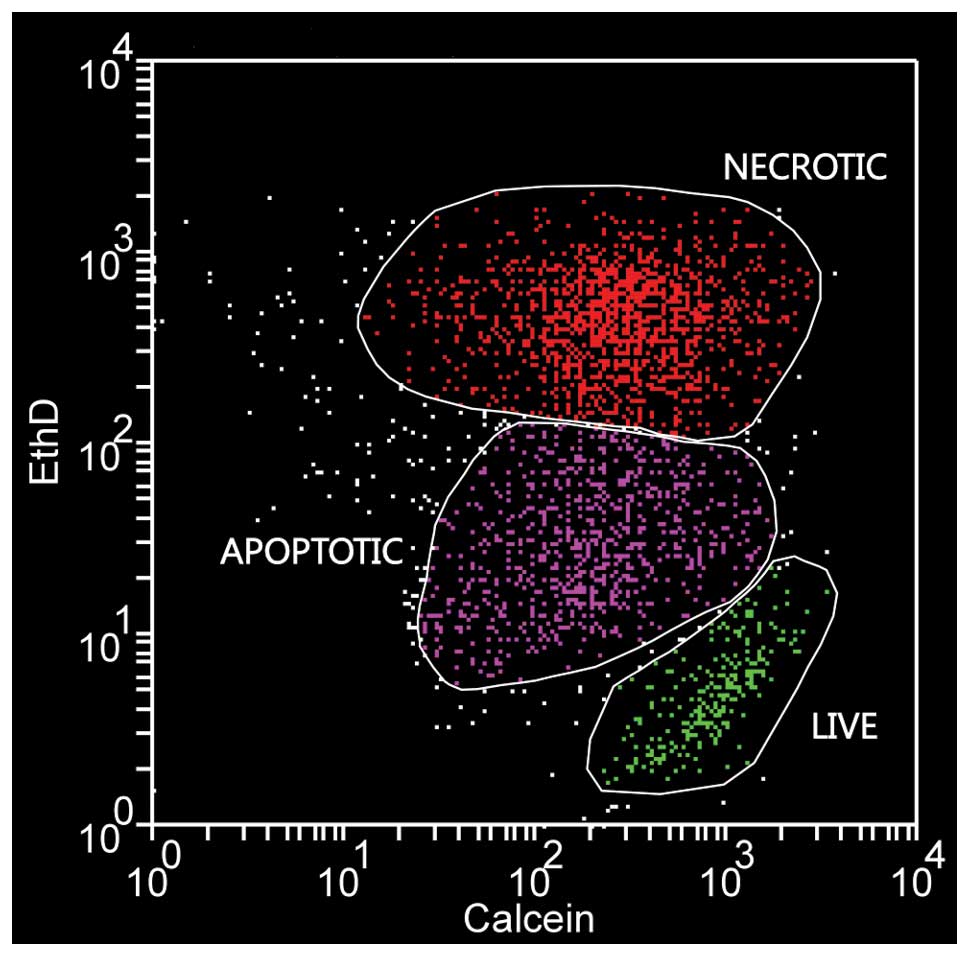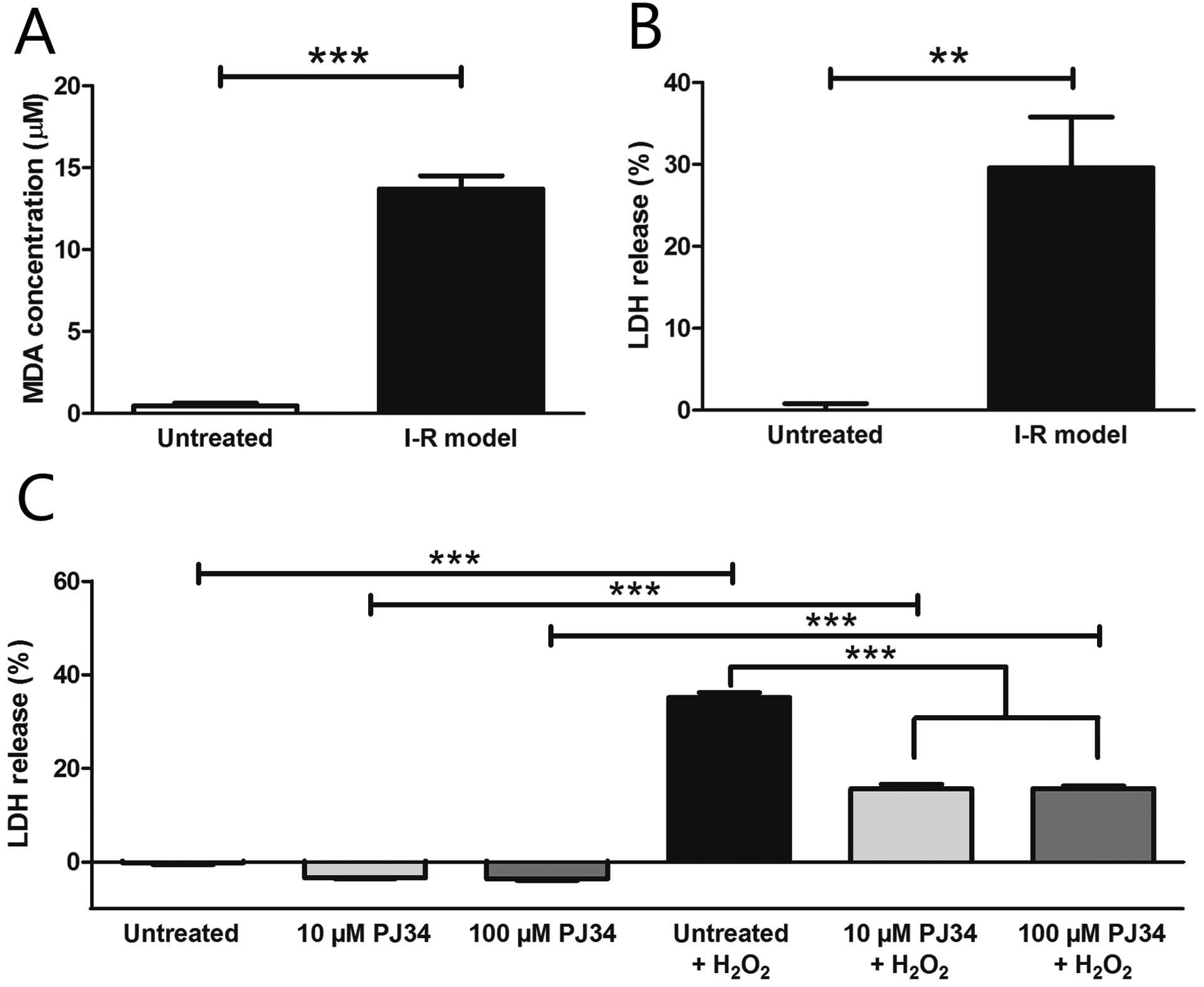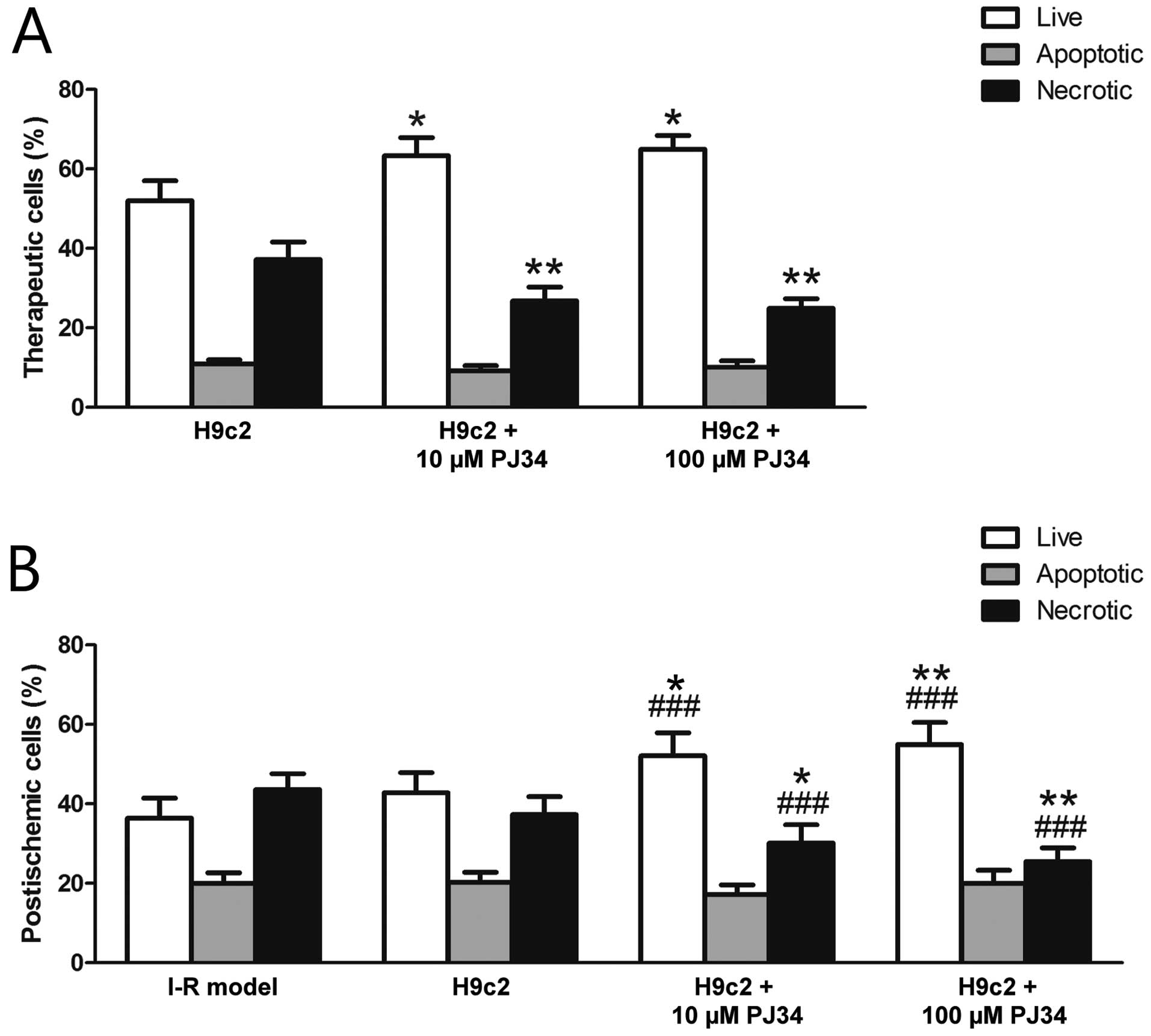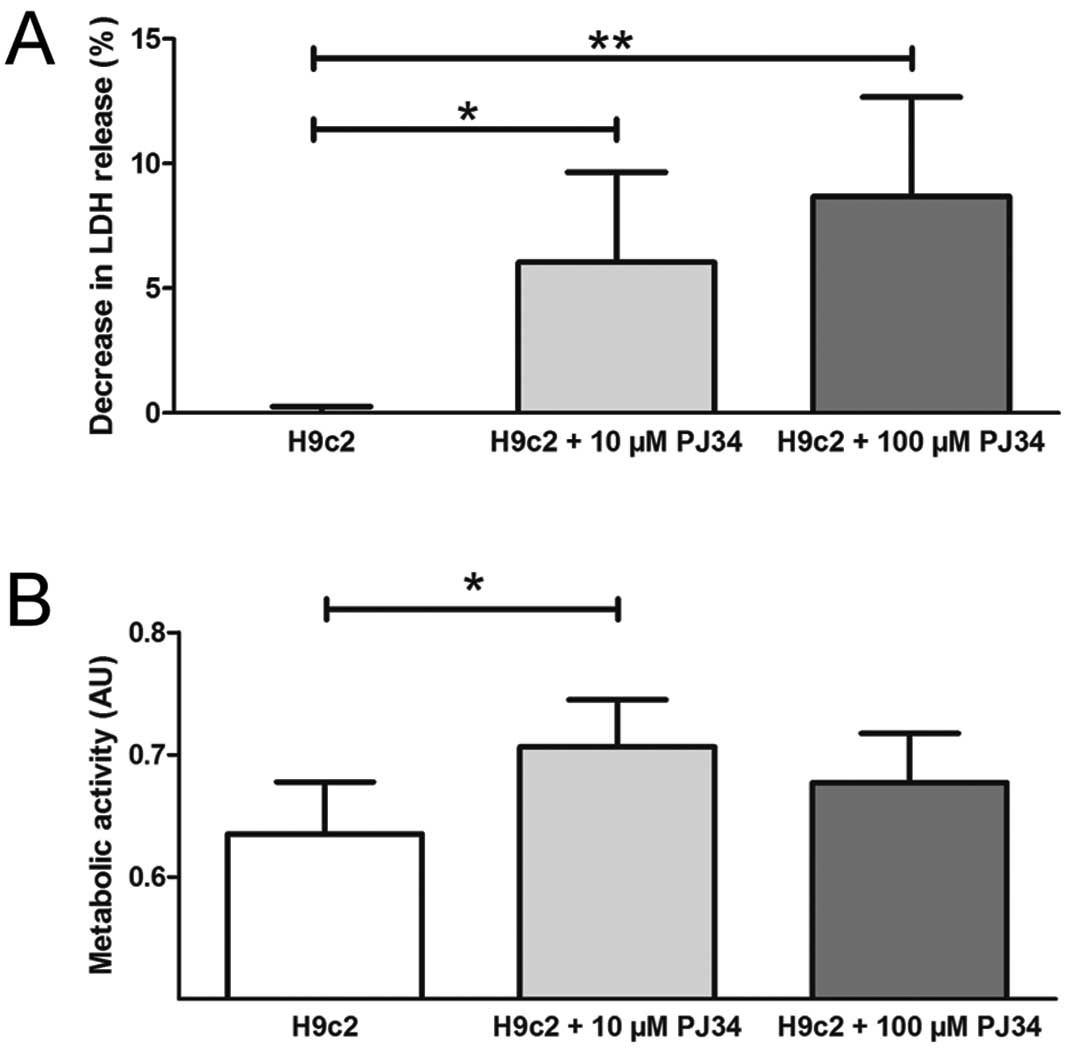|
1
|
Dill T, Schachinger V, Rolf A, et al:
Intracoronary administration of bone marrow-derived progenitor
cells improves left ventricular function in patients at risk for
adverse remodeling after acute ST-segment elevation myocardial
infarction: results of the Reinfusion of Enriched Progenitor cells
And Infarct Remodeling in Acute Myocardial Infarction study
(REPAIR-AMI) cardiac magnetic resonance imaging substudy. Am Heart
J. 157:541–547. 2009.
|
|
2
|
Medicetty S, Wiktor D, Lehman N, et al:
Percutaneous adventitial delivery of allogeneic bone marrow derived
stem cells via infarct related artery improves long-term
ventricular function in acute myocardial infarction. Cell
Transplant. Oct 14–2011.(Epub ahead of print).
|
|
3
|
Paul D, Samuel SM and Maulik N:
Mesenchymal stem cell: present challenges and prospective cellular
cardiomyoplasty approaches for myocardial regeneration. Antioxid
Redox Signal. 11:1841–1855. 2009. View Article : Google Scholar : PubMed/NCBI
|
|
4
|
Penn MS, Dong F, Klein S and Mayorga ME:
Stem cells for myocardial regeneration. Clin Pharmacol Ther.
90:499–501. 2011. View Article : Google Scholar : PubMed/NCBI
|
|
5
|
Abdel-Latif A, Bolli R, Tleyjeh IM, et al:
Adult bone marrow-derived cells for cardiac repair: a systematic
review and meta-analysis. Arch Intern Med. 167:989–997. 2007.
View Article : Google Scholar : PubMed/NCBI
|
|
6
|
Dayan V, Yannarelli G, Billia F, et al:
Mesenchymal stromal cells mediate a switch to alternatively
activated monocytes/macrophages after acute myocardial infarction.
Basic Res Cardiol. 106:1299–1310. 2011. View Article : Google Scholar
|
|
7
|
Ramos GA and Hare JM: Cardiac cell-based
therapy: cell types and mechanisms of actions. Cell Transplant.
16:951–961. 2007. View Article : Google Scholar : PubMed/NCBI
|
|
8
|
Gnecchi M, Zhang Z, Ni A and Dzau VJ:
Paracrine mechanisms in adult stem cell signaling and therapy. Circ
Res. 103:1204–1219. 2008. View Article : Google Scholar : PubMed/NCBI
|
|
9
|
Cselenyák A, Pankotai E, Horváth E, Kiss L
and Lacza Z: Mesenchymal stem cells rescue cardiomyoblasts from
cell death in an in vitro ischemia model via direct cell-to-cell
connections. BMC Cell Biol. 11:292010.PubMed/NCBI
|
|
10
|
Plotnikov EY, Khryapenkova TG, Vasileva
AK, et al: Cell-to-cell cross-talk between mesenchymal stem cells
and cardiomyocytes in co-culture. J Cell Mol Med. 12:1622–1631.
2008. View Article : Google Scholar : PubMed/NCBI
|
|
11
|
Wu KH, Mo XM, Han ZC and Zhou B: Stem cell
engraftment and survival in the ischemic heart. Ann Thorac Surg.
92:1917–1925. 2011. View Article : Google Scholar : PubMed/NCBI
|
|
12
|
Singla DK, Singla RD, Lamm S and Glass C:
TGF-beta2 treatment enhances cytoprotective factors released from
embryonic stem cells and inhibits apoptosis in infarcted
myocardium. Am J Physiol Heart Circ Physiol. 300:H1442–1450. 2011.
View Article : Google Scholar : PubMed/NCBI
|
|
13
|
Singla DK and McDonald DE: Factors
released from embryonic stem cells inhibit apoptosis of H9c2 cells.
Am J Physiol Heart Circ Physiol. 293:H1590–1595. 2007. View Article : Google Scholar : PubMed/NCBI
|
|
14
|
Lichtenauer M, Mildner M, Hoetzenecker K,
et al: Secretome of apoptotic peripheral blood cells (APOSEC)
confers cytoprotection to cardiomyocytes and inhibits tissue
remodelling after acute myocardial infarction: a preclinical study.
Basic Res Cardiol. 106:1283–1297. 2011. View Article : Google Scholar
|
|
15
|
Yao Y, Zhang F, Wang L, et al:
Lipopolysaccharide preconditioning enhances the efficacy of
mesenchymal stem cells transplantation in a rat model of acute
myocardial infarction. J Biomed Sci. 16:742009. View Article : Google Scholar : PubMed/NCBI
|
|
16
|
Hahn JY, Cho HJ, Kang HJ, et al:
Pre-treatment of mesenchymal stem cells with a combination of
growth factors enhances gap junction formation, cytoprotective
effect on cardiomyocytes, and therapeutic efficacy for myocardial
infarction. J Am Coll Cardiol. 51:933–943. 2008. View Article : Google Scholar
|
|
17
|
Mangi AA, Noiseux N, Kong D, et al:
Mesenchymal stem cells modified with Akt prevent remodeling and
restore performance of infarcted hearts. Nat Med. 9:1195–1201.
2003. View Article : Google Scholar : PubMed/NCBI
|
|
18
|
Kubo M, Li TS, Suzuki R, Ohshima M, Qin SL
and Hamano K: Short-term pretreatment with low-dose hydrogen
peroxide enhances the efficacy of bone marrow cells for therapeutic
angiogenesis. Am J Physiol Heart Circ Physiol. 292:H2582–2588.
2007. View Article : Google Scholar : PubMed/NCBI
|
|
19
|
Hausenloy DJ: Signalling pathways in
ischaemic postconditioning. Thromb Haemost. 101:626–634.
2009.PubMed/NCBI
|
|
20
|
Yellon DM and Hausenloy DJ: Myocardial
reperfusion injury. N Engl J Med. 357:1121–1135. 2007. View Article : Google Scholar : PubMed/NCBI
|
|
21
|
Hori M and Nishida K: Oxidative stress and
left ventricular remodelling after myocardial infarction.
Cardiovasc Res. 81:457–464. 2009. View Article : Google Scholar : PubMed/NCBI
|
|
22
|
Pacher P and Szabo C: Role of
poly(ADP-ribose) polymerase 1 (PARP-1) in cardiovascular diseases:
the therapeutic potential of PARP inhibitors. Cardiovasc Drug Rev.
25:235–260. 2007. View Article : Google Scholar : PubMed/NCBI
|
|
23
|
Sodhi RK, Singh N and Jaggi AS:
Poly(ADP-ribose) polymerase-1 (PARP-1) and its therapeutic
implications. Vascul Pharmacol. 53:77–87. 2010. View Article : Google Scholar : PubMed/NCBI
|
|
24
|
Virag L and Szabo C: The therapeutic
potential of poly(ADP-ribose) polymerase inhibitors. Pharmacol Rev.
54:375–429. 2002. View Article : Google Scholar : PubMed/NCBI
|
|
25
|
Ullrich O, Diestel A, Eyupoglu IY and
Nitsch R: Regulation of microglial expression of integrins by
poly(ADP-ribose) polymerase-1. Nat Cell Biol. 3:1035–1042. 2001.
View Article : Google Scholar : PubMed/NCBI
|
|
26
|
Jagtap P and Szabo C: Poly(ADP-ribose)
polymerase and the therapeutic effects of its inhibitors. Nat Rev
Drug Discov. 4:421–440. 2005. View
Article : Google Scholar : PubMed/NCBI
|
|
27
|
Wang Y, Kim NS, Haince JF, et al:
Poly(ADP-ribose) (PAR) binding to apoptosis-inducing factor is
critical for PAR polymerase-1-dependent cell death (parthanatos).
Sci Signal. 4:ra202011.PubMed/NCBI
|
|
28
|
Koh DW, Dawson TM and Dawson VL: Mediation
of cell death by poly(ADP-ribose) polymerase-1. Pharmacol Res.
52:5–14. 2005. View Article : Google Scholar : PubMed/NCBI
|
|
29
|
Fiorillo C, Ponziani V, Giannini L, et al:
Protective effects of the PARP-1 inhibitor PJ34 in
hypoxic-reoxygenated cardiomyoblasts. Cell Mol Life Sci.
63:3061–3071. 2006. View Article : Google Scholar : PubMed/NCBI
|
|
30
|
Oh KS, Lee S, Yi KY, Seo HW, Koo HN and
Lee BH: A novel and orally active poly(ADP-ribose) polymerase
inhibitor, KR-33889 [2-[methoxycarbonyl(4-methoxyphenyl)
methylsulfanyl]-1H-benzimidazole-4-carboxylic acid amide],
attenuates injury in in vitro model of cell death and in vivo model
of cardiac ischemia. J Pharmacol Exp Ther. 328:10–18.
2009.PubMed/NCBI
|
|
31
|
Song ZF, Ji XP, Li XX, Wang SJ, Wang SH
and Zhang Y: Inhibition of the activity of poly(ADP-ribose)
polymerase reduces heart ischaemia/reperfusion injury via
suppressing JNK-mediated AIF translocation. J Cell Mol Med.
12:1220–1228. 2008. View Article : Google Scholar : PubMed/NCBI
|
|
32
|
Liaudet L, Mabley JG, Soriano FG, et al:
Inosine reduces systemic inflammation and improves survival in
septic shock induced by cecal ligation and puncture. Am J Respir
Crit Care Med. 164:1213–1220. 2001. View Article : Google Scholar : PubMed/NCBI
|
|
33
|
Pankotai E, Cselenyak A, Ratosi O, Lorincz
J, Kiss L and Lacza Z: The role of mitochondria in direct
cell-to-cell connection dependent rescue of postischemic
cardiomyoblasts. Mitochondrion. 12:352–356. 2012. View Article : Google Scholar : PubMed/NCBI
|
|
34
|
Palma PF, Baggio GL, Spada C, Silva RD,
Ferreira SI and Treitinger A: Evaluation of annexin V and
Calcein-AM as markers of mononuclear cell apoptosis during human
immunodeficiency virus infection. Braz J Infect Dis. 12:108–114.
2008. View Article : Google Scholar : PubMed/NCBI
|
|
35
|
Dimmeler S, Burchfield J and Zeiher AM:
Cell-based therapy of myocardial infarction. Arterioscler Thromb
Vasc Biol. 28:208–216. 2008. View Article : Google Scholar : PubMed/NCBI
|
|
36
|
Uemura R, Xu M, Ahmad N and Ashraf M: Bone
marrow stem cells prevent left ventricular remodeling of ischemic
heart through paracrine signaling. Circ Res. 98:1414–1421. 2006.
View Article : Google Scholar : PubMed/NCBI
|
|
37
|
Burkle A: Physiology and pathophysiology
of poly(ADP-ribosyl)ation. Bioessays. 23:795–806. 2001. View Article : Google Scholar : PubMed/NCBI
|
|
38
|
Oliveira NG, Castro M, Rodrigues AS, et
al: Effect of poly(ADP-ribosyl)ation inhibitors on the genotoxic
effects of the boron neutron capture reaction. Mutat Res.
583:36–48. 2005. View Article : Google Scholar : PubMed/NCBI
|
|
39
|
Vinod KR, Chandra S and Sharma SK:
Evaluation of 5-aminoisoquinoline (5-AIQ), a novel PARP-1 inhibitor
for genotoxicity potential in vitro and in vivo. Toxicol Mech
Methods. 20:90–95. 2010. View Article : Google Scholar : PubMed/NCBI
|
|
40
|
Kimes BW and Brandt BL: Properties of a
clonal muscle cell line from rat heart. Exper Cell Res. 98:367–381.
1976. View Article : Google Scholar : PubMed/NCBI
|
|
41
|
Sardao VA, Oliveira PJ, Holy J, Oliveira
CR and Wallace KB: Vital imaging of H9c2 myoblasts exposed to
tert-butylhydroperoxide - characterization of morphological
features of cell death. BMC Cell Biol. 8:112007. View Article : Google Scholar : PubMed/NCBI
|















